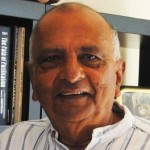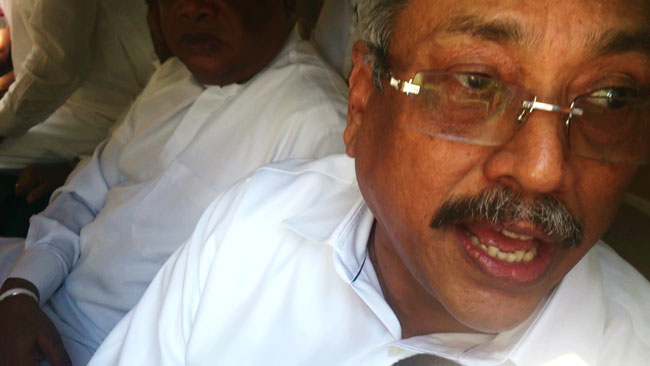UNP: A repetition of 2001-2004
April 23, 2015, 8:13 pm 
Tissa Attanayake
The former general secretary of the UNP Tissa Attanayake crossed the floor of the house and joined Mahinda Rajapaksa’s campaign largely in protest at his party deciding to support Maithripala Sirisena as the common opposition candidate. The fear that he publicly expressed before the election was that if the common candidate wins, the UNP may be left in the lurch. With the abolition of the executive presidency having been successfully torpedoed by the Sirisena camp, the entire gloomy picture painted by Attanayake now appears to be coming true. In this interview he speaks to C. A. Chandraprema about the mess that the UNP has got itself into.
Q. I still remember the speech you made at the meeting held at Sirikotha when Maithripala Sirisena came there for the first time after leaving the SLFP to become the common opposition candidate. You pointedly warned that this process of fielding an outsider as the presidential candidate could result in the party members having to face a grave injustice in the future. Now all that has come true. Sirisena came into power promising to abolish the executive presidency and to cede executive power to the prime minister and cabinet. Today, Sirisena has given the middle finger to all those who supported him, the UNP, the JVP and the various NGOs and basically sabotaged the process of dismantling the executive presidency. Even the pro-UNP websites have now started saying that it is Sirisena himself who is behind the moves to sabotage the abolition of the executive presidency.
A. When the UNP took the decision to field a common opposition candidate I foresaw that situation. We had undergone certain experiences in fielding General Sarath Fonseka at the previous presidential election. I always held the position that the candidate this time around should be a member of the UNP. We had been in opposition for nearly 20 years and our long suffering party members had to be looked after.
I told Mr Ranil Wickremesinghe that if we are going to field an outsider we have to obtain assurances about the due place that the UNP should get. If we were going to get the premiership we had to get assurances about the powers that the prime minister would have. I also told him to get clear assurances about the time frame for abolishing the executive presidential system. Today, all that has fallen by the wayside and UNP activists at the village level and in the workplaces are now disappointed and despondent. Members of the JSS and other UNP trade unions say that even though this is supposed to be a UNP government, they can’t get anything done. The UNP has been deceived and they are now in big trouble. The 100 day programme was a complete sham.
Q. It’s not just the UNP that was involved in the common candidate project. There was the JVP too. Sirisena may have executive power but the UNP has a large vote base and the JVP has organisational ability so they have people power. If the pledges that have been given are not being met, there are ways and means of ensuring that the pledges are kept especially when the president has been elected on UNP votes.
A. There were several pledges given to the people. The people were assured that the executive presidency would be abolished. A good proportion of the floating vote went to Sirisena because people believed that promise. The people expected total abolition and they thought there would be no more presidential elections and we would revert to a prime ministerial system of governance. The 19th Amendment is an unsuccessful piece of legislation which does not fulfil the pledge given to abolish the executive presidency.
Q. Why do you think the UNP stooped so low as to agree to this 19th Amendment which only pretends to abolish the executive presidency?
A. On the one hand they probably think that Sirisena will not be a challenge to them and that they can continue even with his powers remaining intact. Then perhaps they probably don’t want the executive presidency abolished completely either because they see opportunities for themselves in the future.
Q. We see that Mahinda loyalists are out on the streets demanding his return to power. They can mobilise crowds at short notice. But after the 8th January, we never saw a single UNP rally – not even one demanding the abolition of the executive presidency. What is the reason for such paralysis?
A. The main reason for this is that UNPers are now completely disillusioned and despondent.
Q. What you are saying is that they can’t be motivated to come out onto the streets?
A. If you talk to ten UNP activists or voters, eight would say that there is now no point in such things. I still maintain close contact with members of the UNP. One criticism that I hear from village level activists of the party is that even though they had brought the present government into power with great difficulty, the party leaders don’t care for them.
Q. That sounds like a replay of 2001-2004.
A. That is exactly what is happening. The government has not been able to convince the UNP rank and file that they will stand to benefit from the present government. A criticism that is often heard is that ministers can’t be contacted even over the phone. The ministers are said to be behaving as if they would be in power for the next 25 years. If members of the UNP came out enthusiastically at the presidential election, that enthusiasm has now fallen by about 75% by now. It will not be easy to motivate UNPers at the village level.
Q. If despondency is spreading among party members at the village level, that should come to the notice of the UNP ministers as they too interact with their voters on a daily basis. One of the reasons why the UNP ministers have not attempted to organise any UNP rallies would also be due to the fact that they sense that the party rank and file would not respond.
Then why are they brimming with confidence as you yourself said? Take for instance the way the prime minister Ranil Wickremesinghe behaved in parliament on Tuesday in the wake of that fiasco involving summons issued to Mahinda Rajapaksa by the Bribery Commission. The MR camp had just got a majority in parliament with 118 signatures in favour of Mahinda which means the prime minister is living on borrowed time. Yet there he was, shouting and laughing in parliament as if he had not a care in the world!
A. The reason for that is nothing but over confidence. This is what happened to us after 2001 as well. When our leaders were told about the dissolution of parliament in 2004, they took no notice. This is why members of the UNP cabinet think nothing of distancing themselves from the party rank and file. To them, interacting with the public is now a tedious and unpleasant task because people are asking for jobs, houses, transfers and many other things. While the UNP ministers are drifting apart from their own supporters, people are gathering around Mahinda Rajapaksa in huge numbers.
Even though Maithripala Sirisena is the leader of the SLFP on paper, the SLFP members at the village level do not appear to be willing to accept him as their leader. Though he is both the head of state and the leader of the party, the people’s representatives of his own party disobey his orders and attend meetings and sign petitions and stage demonstrations in favour of Mahinda. The reason for this is that people believe Mahinda Rajapaksa can provide leadership. He is filling a leadership void. When a leader who had been ruling the country for the past 9 years is defeated and the people start clamouring for his return within just three months, we have to understand that something has gone wrong somewhere. The reason for that phenomenon is that the people have lost faith in the president and the government.
Q. The SLFP was in power for a long time. When you have been in power for that long, you get used to power and are unable to live without it. Despite this, ordinary SLFP activists at the village level have shown remarkable uprightness. Sirisena is the leader of their party and he is going to be the all powerful executive president for the next six years yet they care not a twit about him. They don’t want him or his power, they cry with one voice that they want Mahinda back. Don’t you wish sometimes that members of the UNP too had a backbone like that?
A. I too am full of admiration for the present behaviour of members of the SLFP. They know exactly who their natural leader is, and they are willing to follow him no matter what. This is a shining example for all political parties.
 කවුරු කිවුවත් තමන් 19 වැනි ව්යවස්තා සංශෝධනයට ඡන්දය නොදෙන බව පාර්ලිමේන්තු මන්ත්රී විදුර වික්රමනායක මහතා කියා සිටියේය.
කවුරු කිවුවත් තමන් 19 වැනි ව්යවස්තා සංශෝධනයට ඡන්දය නොදෙන බව පාර්ලිමේන්තු මන්ත්රී විදුර වික්රමනායක මහතා කියා සිටියේය.


COMMENTS
Why doesnt the GOSL go public
Mostly persons with
How on earth Swiss Bank
This kind of information